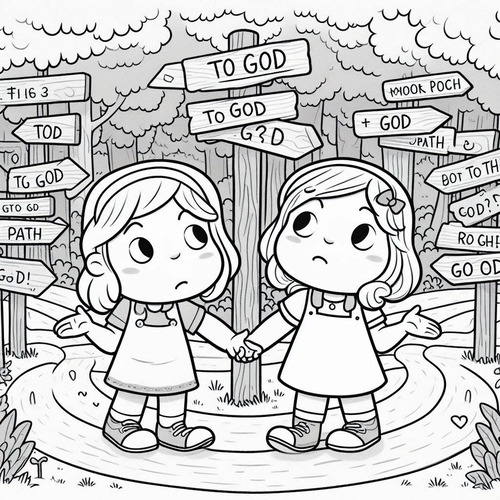Panentheism’s Objections: A Christian Rebuttal
Understanding Panentheism: Panentheism, often described as “all in God,” is a worldview that posits the universe exists within God but is not identical to God. Unlike pantheism, which asserts God and the universe are one and the same, panentheism maintains a distinction between God and creation. In this belief system, God is seen as both immanent (present within the universe) and transcendent (existing beyond the universe), with the universe being a part of God, yet God being greater than the sum of all parts.
In panentheism, God interacts with the universe dynamically, evolving with it, and the divine reality is believed to be enriched or affected by the world. This worldview suggests a closer relationship between God and creation than classical theism allows, proposing God’s very being is interwoven with the processes and developments within the universe.
Common Panentheist Objections to Christianity
- The Traditional Christian View of God is Too Distant and Detached: Panentheists often argue the traditional Christian concept of God—as a wholly transcendent being—makes God seem distant, detached, and uninvolved in the everyday realities of the universe. They suggest this view diminishes the relationship between God and creation, making God appear aloof and unengaged with the world’s ongoing struggles and developments.
- God Must Be Mutually Dependent on Creation for True Relationship: Another objection raised by panentheists is the belief that a meaningful relationship between God and creation requires mutual dependence. In other words, just as creation depends on God, God should also be affected by creation, growing and evolving with it. Panentheists contend the Christian view of God’s immutability (unchanging nature) and self-sufficiency undermines the dynamic relationship they believe should exist between God and the universe.
- God’s Immanence is Overlooked in Christian Theology: Panentheists argue Christian theology places too much emphasis on God’s transcendence at the expense of immanence. They believe God’s presence within creation is not merely an expression of His power and knowledge but involves a deeper, ontological connection where God’s being is shared with the cosmos. In their view, Christianity fails to recognize the extent to which God is actively present and involved in the fabric of the universe.
- The Problem of Evil is Better Addressed by Panentheism: Panentheists claim their view better addresses the problem of evil and suffering. They argue that if God is within the universe and evolving with it, God is not the omnipotent, unchanging source of all events. Instead, God is seen as working through the limitations and imperfections of the universe to bring about good. This allows them to see God as empathetic and suffering alongside creation, rather than as a distant, omnipotent deity who permits evil and suffering.
Christian Responses to Panentheist Objections
God’s Transcendence Does Not Mean Distance: From a Christian perspective, God’s transcendence does not imply distance or detachment. The Bible presents God as both transcendent and immanent. God is exalted above creation (Isaiah 55:8-9) and simultaneously upholds and sustains it (Hebrews 1:3). Christianity teaches God is actively involved in the world, guiding and interacting with His creation. This is most clearly seen in the incarnation of Jesus Christ, where God entered into human history, demonstrating His intimate concern and involvement. God’s sovereignty does not mean He is uninvolved; rather, it assures believers God is in control and personally engaged in the lives of His people.
God’s Relationship with Creation Does Not Require Mutual Dependence: In Christian theology, God is fully self-sufficient and does not need creation to complete or enrich Himself. This is because God is perfect and infinite in His being, knowledge, and power. While God does establish a real and meaningful relationship with creation, this relationship is based on God’s gracious choice, not necessity. God’s love and interaction with creation are expressions of His character, not requirements for His fulfillment. The idea of mutual dependence undermines God’s sovereignty and the biblical portrayal of God as the all-powerful Creator who upholds all things by His will (Colossians 1:16-17). The Christian view affirms that God loves His creation and desires a relationship with it, but this relationship does not imply any deficiency in God Himself.
The Christian Doctrine of Immanence is Robust and Balanced: Christianity affirms God’s immanence. God is present everywhere, actively sustaining the universe and governing all events according to His purpose (Acts 17:28). However, this immanence does not blur the Creator-creature distinction. God’s presence within creation does not imply that He is ontologically identified with it. God remains distinct from His creation, maintaining His holiness and sovereignty. This distinction is important to preserve the integrity of God’s nature and the created order, preventing the worship of creation (Romans 1:25) and affirming God’s ultimate authority over all things.
The Christian God is Both Sovereign Over and Compassionate Towards Suffering: The problem of evil is a profound mystery, but the Christian response is grounded in the character of God as both sovereign and compassionate. While God is sovereign over all events, including suffering, He is not the author of evil. Evil results from the rebellion of created beings against God’s will. Yet, God, in His sovereignty, uses even the presence of evil to bring about His good purposes (Romans 8:28). The incarnation and suffering of Jesus Christ reveal that God is not detached from the pain of the world. God entered into human suffering, taking on the consequences of sin and evil, and provided redemption through the cross. This demonstrates God’s profound empathy and love, offering hope and the promise of ultimate restoration.
Conclusion: The Uniqueness of the Christian God
The Bible affirms God is both transcendent, existing beyond and independent of creation, and immanent, intimately involved with His creation. This balance allows for a God who is sovereign, all-powerful, and wholly other, yet also personal, relational, and compassionate. Christianity provides a comprehensive understanding of God that meets the deepest human needs for a relationship with a loving Creator while maintaining the truth of His infinite and perfect nature. By affirming both the transcendence and immanence of God, Christianity offers a compelling response to the objections raised by panentheism, presenting a vision of God that is biblically grounded and theologically rich.
Related FAQs
- If God is transcendent and separate from the material world, how can God truly be omnipresent and intimately involved in creation? Christians believe God is both transcendent (above and beyond the physical universe) and immanent (present within creation). Though distinct from the material world, God continuously sustains and interacts with it through divine providence and the person of the Holy Spirit.
- How can a God separate from the world truly know the intimate details of every person’s life and experience? Christians believe God’s omniscience and intimate knowledge of each person stems from God’s eternal, timeless nature. As the all-knowing Creator, God transcends the limits of human experience while also actively engaging with and caring for each individual.
- If God created the world ex nihilo (out of nothing), how can the world be considered truly real or substantial, rather than just an illusion or shadow of the divine? Christians affirm the reality and goodness of the physical world, which was created by God and declared “very good.” Though dependent on God for its existence, the world is not merely an illusion but has true substance as the handiwork of the divine Creator.
- How can a God separate from the world truly empathize with human suffering and limitation? Christians believe God entered into human experience through the incarnation of Jesus Christ, who fully experienced human life, including suffering and limitation. This allows God to deeply empathize with the human condition.
- If God is the sole fundamental reality, how can evil, sin, and other negative realities be accounted for without implicating God? Christians believe evil and sin, while real, are not fundamental realities but distortions or perversions of God’s good creation. God permits the existence of evil temporarily for the sake of human free will and the ultimate triumph of good.
- Which religions are Panentheistic? Panentheism holds that the divine interpenetrates every part of nature but is also beyond nature. This view is found in some forms of Hinduism, particularly in Ramanuja’s Vishishtadvaita Vedanta. Certain interpretations of Christianity, especially in Process theology, embrace panentheistic ideas. Some Native American spiritualities and aspects of Kabbalah in Judaism have also been described as panentheistic. Like pantheism, panentheistic elements can appear in various religious and philosophical traditions to different degrees.
Related Posts
Editor's Pick

Paul’s Mandate for Men: Headship Or Servant Leadership? Or Both?
Modern Christianity has fallen into a trap. We've created an either/or battle between "headship" and "servant leadership," as if these [...]

Should We Stop Using Male Pronouns for God? Why Do We Say No?
A friend of ours arrived eagerly at his first theology class in seminary. But he quickly discovered something troubling: the [...]

Did Old Testament Law Force Women to Marry their Rapists?
**Editor’s Note: This post is part of our series, ‘Satan’s Lies: Common Deceptions in the Church Today’… Viral misinformation abounds [...]

From Danvers To Nashville: Two Statements, One Biblical Vision
30 years separate the Danvers Statement on Biblical Manhood and Womanhood (1987) and the Nashville Statement on Human Sexuality (2017). [...]

The Nashville Statement: Why Affirm It Despite Media Backlash?
WHY DO REFORMED CHRISTIANS STAND BY THIS STATEMENT ON MARRIAGE AND GENDER? When the Nashville Statement was released in 2017, [...]

Who Is Belial? Solving The 2 Corinthians 6:15 Mystery
Belial: This name from the pages of Scripture chills the soul. Who is this mysterious figure Paul invokes in 2 [...]

Celibacy Or Castration: What Jesus Really Means in Matthew 19:12
One of Scripture's most shocking misinterpretations led theologian Origen to castrate himself in the third century. His tragic mistake? Taking [...]

Philippians 4:13: Did Paul Really Mean We Can Do ALL Things?
"I can do all things through Christ who strengthens me." It's on gym walls, graduation cards, and motivational posters everywhere. [...]

The Ordinary Means of Grace: Why Are They Indispensable?
ORDINARY MEANS FOR EXTRAORDINARY TRANSFORMATION What if God's most powerful work in believers' lives happens through the most ordinary activities? [...]

Is the Bible God’s Word? Or Does It Only Contain God’s Word?
The authority of Scripture stands at the crossroads of modern Christianity. While some argue the Bible merely contains God’s Word [...]
SUPPORT US:
Feel the Holy Spirit's gentle nudge to partner with us?
Donate Online:
Account Name: TRUTHS TO DIE FOR FOUNDATION
Account Number: 10243565459
Bank IFSC: IDFB0043391
Bank Name: IDFC FIRST BANK






